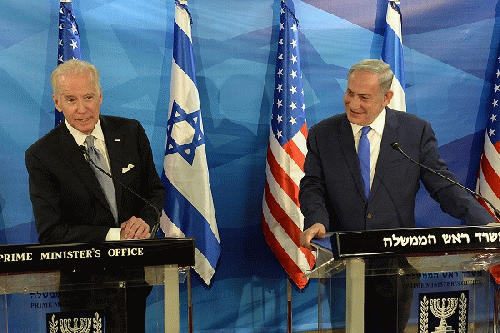
By killing Fakhrizadeh Israel is doing its best to ensure that for Biden that military action is the only viable option available
(Image by U.S. Embassy Tel Aviv, CC BY 2.0 , via Wikimedia Commons) Details DMCA
Mohsen Fakhrizadeh was the shadowy father of Iran's nuclear program; his existence, let alone his work, was barely acknowledged by Iran. A brigadier general with the Islamic Revolutionary Guard Command, Fakhrizadeh was involved in the academic aspects of Iranian national security, eventually heading up the Physics Research Center, where he masterminded the design and material acquisition in support of Iran's uranium enrichment effort.
In April 2018, Israeli Prime Minister Benjamin Netanyahu named Fakhrizadeh as the head of a covert military dimension to Iran's nuclear program, something Iran has vociferously denied. On Friday, November 28, 2020, the 62-year-old scientist was assassinated just outside the Iranian capital of Tehran. While no one has taken credit for his murder, Iran has placed the blame for his death squarely on Israel.
At the time of his death, Fakhrizadeh was the head of the Research and Innovation Organization (RIO), part of the Iranian Defense Ministry. A June 2020 report on nonproliferation published by the US Department of State alleged that Fakhrizadeh used the RIO "to keep former weapons program scientists employed " on [nuclear] weaponization-relevant dual-use technical activities " to aid in any future nuclear weapons development work in the event that a decision were made to resume such work."
This belief, when combined with Iran's decision to cease abiding by the provisions of the landmark 2015 Joint Comprehensive Plan of Action (JCPOA, better known as the Iran nuclear agreement) regarding the stockpiling of low-enriched uranium and the use of advanced centrifuges to enrich uranium, had the de facto effect of signing Fakhrizadeh's death warrant.
The JCPOA-imposed restrictions were designed with a one-year 'breakout' scenario in mind - in short, the time it would take Iran to produce enough highly enriched uranium to create a single nuclear device once the decision was made to cease adhering to restrictions on the numbers and types of centrifuges it could operate, the level of enrichment permitted, and the amount of low-enriched uranium allowed to be stockpiled.
In May 2019 - one year after President Donald Trump withdrew the US from the JCPOA - Iran began pulling back from its commitments under the agreement, citing its right to do so under Articles 26 and 36 of the deal, which allow a party to the agreement to cease its obligations if another party is found to be in noncompliance; Iran maintains that the failure of Europe to live up to its economic commitments under the JCPOA constituted demonstrable noncompliance. The end result is that today the 'breakout' period has shrunk to a few weeks.
For the Trump administration, Iran's noncompliance with the JCPOA had placed it in a quandary; the policy of sanctions-based 'maximum pressure' which had been instituted since 2018 was clearly not working when it came to the goal of compelling Iran to return to the negotiation table and hammer out a new, more restrictive nuclear deal.
Having gone on record regarding its belief that Iran continued to maintain covert nuclear weapons ambitions, the Trump administration was confronted with the reality that it had, according to its own beliefs, empowered Iran to produce a nuclear weapon in a time frame that posed a direct threat to the US and its regional allies, in particular Israel and Saudi Arabia. This concern was behind recent press reports that President Trump was considering military options against Iran's nuclear program.
For Israel, the issues are even more acute; whereas Iran's potential acquisition of a nuclear weapons capability would pose a policy conundrum for the US, for Israel an Iranian nuclear weapon would represent an existential threat. For this reason, Israel has historically pulled few punches when it comes to confronting even the possibility of an Iranian nuclear weapons capability.
While much of the intelligence underpinning the US and Israeli assessments regarding the existence of a nuclear weapons program are derived from sources of questionable provenance and are not conclusive, Israel has taken an absolutist posture; it's given credence to sources that otherwise might be consigned to the bottom drawer.
In its effort to win support for this position, Israel has exaggerated - even fabricated - intelligence on Iran, undermining its credibility to such an extent that, when Israel reported that its intelligence stole a nuclear archive from Iran in early 2018, the veracity of this claim was called into question after documents previously held to have been forged were claimed to be part of the document trove.
Israel's actions against Iran's nuclear program have been anything but passive; in 2009-2010, Israel worked with US intelligence to launch a cyberattack using the Stuxnet virus to infect Iranian centrifuge operations at Natanz. This was followed by a program of targeted assassinations which killed four Iranian nuclear scientists between 2010-2012 (a fifth attack narrowly missed killing the head of the Iranian Atomic Energy Organization).
Israeli intelligence is also said to be behind a series of mysterious explosions at Iranian nuclear-related facilities earlier this year which caused significant damage and disruption to Iran's centrifuge program. While Israel has not taken responsibility for the assassination of Mohsen Fakhrizadeh, his murder can logically be viewed as a continuation of Israel's efforts to degrade Iran's nuclear capabilities.
Joe Biden is no stranger to the active measures taken by Israel in this regard. As vice president, he sat in on critical meetings regarding the deployment of the Stuxnet virus. He was fully cognizant of the pressure being placed on President Obama regarding military action against Iran, and understood the role played by the assassination of Iranian nuclear scientists in ratcheting this pressure up.
(Note: You can view every article as one long page if you sign up as an Advocate Member, or higher).





